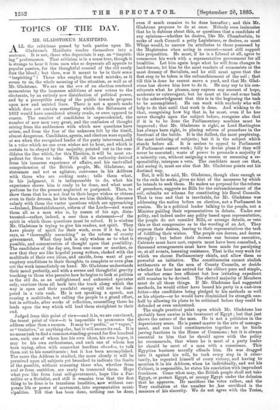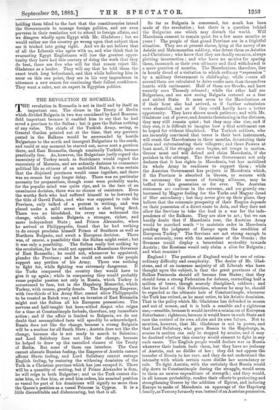TOPICS OF THE DAY.
MR. GLADSTONE'S MANIFESTO.
ALL the criticisms passed by both parties upon Mr. Gladstone's Manifesto resolve themselves into a sentence. It is not, those who depreciate it say, an " inspirit- ing " performance. That criticism is in a sense true, though it is strange to hear it from men who so deprecate all appeals to popular passion, for the thoughtful counsel of the old rarely fires the blood ; but then, was it meant to be in their sense " inspiriting " Those who employ that word mistake, as it seems to us, the whole meaning of the situation, as well as of Mr. Gladstone. We are on the eve of an election rendered momentous by the immense additions of new voters to the electorate, by an entirely new distribution of political power, and by a perceptible swing of the public towards progress upon new and untried lines. There is not a speech made which does not contain something which the Reformers of 1832 would have considered utterly crude, or even opposed to reason. The number of candidates is unprecedented, the number of new men very great, and the confusion of thought arising from the suddenness with which new questions have arisen, and from the fear of the unknown felt by the timid, almost dangerous. Candidates, agents, and electors were equally at sea when the recognised leader of the party intervened, and in a voice which no one even wishes not to hear, and which is certain to be obeyed by the majority, pointed out to the can- didates the line which, for this Election, it will be most ex- pedient for them to take. With all the authority derived from his immense experience of affairs, and his unrivalled comprehension of the British people, Mr. Gladstone, as statesman and not as agitator, converses in his Address with those who are seeking seats ; tells them what, in his judgment, it is indispensable to do, what his experience shows him is ready to be done, and what must perforce be for the present neglected or postponed. Then, to show them that he is not deaf to their larger wishes or obtuse. even to their dreams, he lets them see him thinking, discusses calmly with them the vaster questions which are approaching —Ireland, Disestablishment, reform of the Lords—and warns them all as a man who is, by reason of his age, disin- terested—rather, indeed, a seer than a statesman—of the spirit in which those questions must be solved. It is wisdom Mr. Gladstone is trying to give his readers, not spirit. They have plenty of spirit for their work, even if it be, as he says, to "thoroughly unexciting" as the reform of county government. What they lack is only wisdom as to what is possible, and concentration of thought upon that possibility. The candidates of the day are, from one cause or another, so new that they are like hopeful young writers, choked with the multitude of their own ideas, and unable, from want of per- emptory conditions to their thoughts, to complete or even plan out the work immediately on hand. Mr. Gladstone understands their mood perfectly, and with a serene and thoughtful gravity touching to those who perceive how he begins to look at politics as the old do, as an unfrightened and unhurried spectator only, cautions them all back into the track along which the way is open and their youthful energy will not be dissi- pated in a vain rush. He is not speaking a speech, not rousing a multitude, not calling the people to a grand effort, but in solitude, after weeks of reflection, counselling those he leads upon the way which will lead them straightest to their end.
Judged from this point of view—and it is, we are convinced, the truest point of view—it is impossible to pronounce the address other than a success. It may be " prolix, ' or " vague," or " tentative," or anything else, but it will secure its end. It is no mean task to find a common standing-ground for five hundred men, each one of whom has his own ideas, his own hopes, it may be his own enthusiasms, and each one of whom has been trying, often with somewhat heedless abandon, to talk them out to his constituents ; but it has been accomplished. The more the Address is studied, the more clearly it will be perceived upon all subjects yet broached to indicate the limits of the possible, without censuring those who, whether from zeal or from ambition, are ready to transcend them. Hope what you like from local self-government, hope like a Par- nellite or a Socialist, and still it remains true that the first thing to be done is to transform localities, now without cor- porate life or power of movement, into representative muni- cipalities. Till that has been done, nothing can be done, even if much remains to be done hereafter ; and this Mr. Gladstone proposes to do at once. Nobody even insinuates that he is dubious about this, or questions that a candidate of any opinions—whether he desires, like Mr. Chamberlain, to make of each Council a petty Legislature, or desires, as most Whigs would, to narrow its attributes to those possessed by the Magistrates when acting in concert—must still support this proposition. He must, if he is a Liberal at all, agree to commence his work with a representative government for all localities. Let him again hope what he will from changes in land-tenure, let him be the most resolute of economists or the most dreamy of Socialists, and he still must agree that the first step to be taken is the enfranchisement of the soil ; that till this is done he cannot move a yard, and that Mr. Glad- stone has shown him how to do it. He may say to his con- stituents what he pleases, may express any amount of hope, moderate or extravagant, but he must at the end come back to the acknowledgment that this is in the beginning the task to be accomplished. He can work with anybody who will help to do that until that work is done. And wishing to do that, recognising how big that is, he must, even if he has never thought upon the subject before, recognise also that if it is to be done the Parliamentary machine must be improved ; that Mr. Gladstone is right, as Lord Hartington has always been right, in placing reform of procedure in the forefront of the battle. It is the dullest, the most perplexing, the most irritating of subjects ; but it is the subject which stands before all. It is useless to appeal to Parliament if Parliament cannot work ; folly to devise plans if they will never be executed ; waste of power to persuade a majority if a minority can, without assigning a reason or assuming a re- sponsibility, interpose a veto. The candidate must see that, and seeing it, must see also that Mr. Gladstone points out his destined way.
But, it will be said, Mr. Gladstone, though clear enough as to the ends he seeks, gives no hint of the measures by which he intends to seek them. He makes no proposal for the reform of procedure, suggests no Bills for the enfranchisement of the soil, submits no scheme for constituting his Rural Councils. That is true and that is inevitable, for Mr. Gladstone was addressing the nation before an election, not a Parliament in session. He is a political leader talking to the people, not a Minister guiding their representatives in debate. Under our polity, and indeed under any polity based upon representation, the people do not consider Bills, or arrange details, or veto this or that compromise as to the wording of an Act. They express their desires, leaving to their representatives the task of fulfilling their wishes. The people can decree, and decree strongly ; but before their decrees can become executive, Cabinets must have met, experts must have been consulted, a thousand arrangements must have been made for paralysing or, at all events, lessening resistance. That is the very work for which we choose Parliamentary chiefs, and snow them so powerful an initiative. The constituencies cannot abolish settlements or fix the area of County Councils, or decide whether the hour has arrived for the cloture pure and simple, or whether some less efficient but less irritating expedient still remains to be devised. The elected majority of Members must do all those things. If Mr. Gladstone had suggested methods, he would either have bound his party in a cast-iron fetter—the candidates being pledged to his methods as well as his objects—or he would have diminished its strength one- half by allowing its plans to be criticised before they could be defended or even understood.
The single practical point upon which Mr. Gladstone has probably been unwise is his treatment of Egypt ; but that just shows the nature of the man. He is not a politician in the depreciatory sense. He is passed master in the arts of manage- ment, and can bind constituencies together as he binds jarring fractions in the House of Commons ; but it is always essential to him that he should agree with the policy he recommends, that where he is most of a party leader he should be most of a man with a conscience. This Egyptian business morally offends him. He was dragged into it against his will, he took every step in it reluc- tantly, he repented himself of every victory, and having to mention it in his Address, when he individually, and not his Cabinet, is responsible, he states his conviction with imprudent frankness. Come what may, the British people shall not take Egypt, or protect Egypt, or occupy Egypt under the delusion that he approves. He sacrifices the votes rather, and the Tory exultation at the number he ,has sacrificed is the measure of his sincerity. We do not agree with the Tories, holding them blind to the fact that the constituencies intend the Governments to manage foreign politics, and are even perverse in their resolution not to attend to foreign affairs, and we disagree wholly upon Egypt with Mr. Gladstone ; but we would rather see the country go wrong upon that subject than see it tricked into going right. And we do not believe that of all the Liberals who agree with us, and who think that in evacuating Egypt Englishmen will lose the greatest oppor- tunity they have had this century of doing the work that they do best, there are five who will for that reason reject Mr. Gladstone as a leader. They will say that he told them the exact truth long beforehand, and that while believing him in error on this one point, they see in his very imprudence in utterance a new reason for continuing their fullest confidence. They want a ruler, not an expert in Egyptian politics.



































 Previous page
Previous page